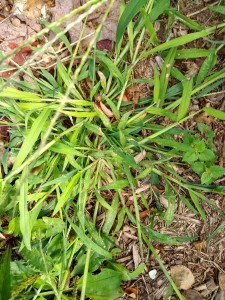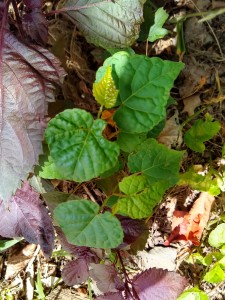
Longwood Gardens in Kennett Square, Pennsylvania, is one of my favorite garden destinations. For the price of admission, you can spend a day wallowing in world class horticultural splendor and, unless you venture into the less cultivated areas, you will never see weeds. The beds are meticulously tended and if any weed dares to raise its head, it is plucked out of the ground by a vigilant staff person.
Some days I wish that my garden were more like Longwood.
Other days, however, I am grateful for my weeds, from the first onion grass in spring, through the tenacious crabgrass of summer and then, full circle, back to onion grass in late fall. When you are bored, frustrated, or otherwise out of sorts, there is nothing like weeding out a bed or corner to bring a sense of accomplishment. I don’t even mind weeding in the dog days of summer, when the heat is scorching and the baked earth hesitates to give up even shallow-rooted weeds. Of course, if the temperature is above 85 degrees Fahrenheit, I confine my weeding to early morning, early evening, or ten minute increments at other times of the day.
It is amazing what a difference even ten minutes of weeding can make if you focus on a single area and have your gloves and tools close at hand. This fact may also bring some comfort to those who hate weeding.
Presuming that you can tell the desirable plants from the weeds, pulling weeds is fairly mindless work. You have to pay enough attention to get the interlopers out by the roots, but otherwise, you can relax and let your brain consider other things.
There are those who listen to music while weeding, or take their phones along. I don’t do either of those things unless I am expecting an urgent message or call. Texts from my sister on her sons’ latest accomplishments do not count as “urgent”.
I prefer to listen to the music of the garden and the neighborhood. Sometimes that music is prosaic and includes the thrumming of mowers, the blasting of leaf blowers or the mechanical whine of chainsaws. What I like best is when all that garden maintenance noise ceases and I can enjoy the special stillness of a summer day. The stillness is deceptive though, because it harbors a multitude of sounds. In my garden the gray catbird comments on everything and gets particularly vocal when our nineteen year-old cat, Sarah, makes one of her daily pilgrimages to the back porch. The resident cardinals sing “chip, chip” to each other and, in high summer, wood doves coo softly while promenading on the brick paths. The cicadas compete from the trees with long sequences of high-pitched droning.
This summer weeding has been a special joy because of the butterflies. The butterfly bushes, Joe Pye weeds and other plants have hosted more winged visitors than they have in years. It is not uncommon in my backyard right now to see at least three orange and black monarchs vying for the available nectar. They are joined by tiger swallowtails, both the normal yellow-winged type and the females with variant coloring that is predominately black. Red admirals and their relatives, the painted ladies, have been regular visitors, as have common cabbage white butterflies and silver-spotted skippers. When I am on my knees weeding in their midst the butterflies ignore me, as long as I am not flinging weeds around. This gives me the chance to appreciate their colors and flight patterns.
Of course, weeding is not all butterflies and rainbows. If you have a large garden or a somewhat neglected one, it can be hard work. That is why I save myself time and energy by covering paths with porous landscape fabric blanketed by cedar mulch. Back behind the large shrubs where no one will be the wiser, is a carpet of newspaper completely covered by a thick layer of pulled weeds, which wither into brown, inexpensive mulch in a matter of days. Using the discarded weed method controls new weeds, recycles garden waste and reduces the amount of bagged material that I have to put out at the curb for weekly pick-up. When I get the chance, I also apply cedar mulch to the bare ground in the beds. This practice does not prevent weeds, but it does slow them down.
I believe it was the Shakers who admonished gardeners to “weed ceaselessly”. If you can’t do that—and most of us wouldn’t want to– at least weed regularly, with all your senses engaged. The benefits to both garden and gardener are worth the trouble.

